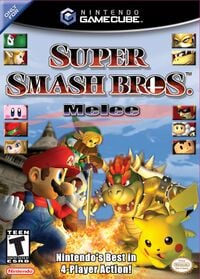Super Smash Bros. Melee
Super Smash Bros. Melee (Japanese: 大乱闘 スマッシュ ブラザーズDX, Dairantō Sumasshu Burazāzu Derakkusu, Great Fray Smash Brothers Deluxe, often known as "SSBM" or "Melee") is a 2-D fighting game for the Nintendo Gamecube. It was released in late 2001 in America and Japan, shortly after Gamecube's launch, and early 2002 in Europe.
Like Super Smash Bros., its predecessor, Melee features gameplay unique from that of other fighting games. Compared to characters in other fighting games, Melee characters have simple movesets, lack complicated button inputs and lengthy natural combos. In contrast, however, Melee greatly emphasizes movement and ringouts. Indeed, edge-guarding in Melee takes on much more significance than it does in most other games due to copious mid-air jumps and other methods of reaching the edge unfettered.
Characters
There are 14 starter characters and 11 more which can be unlocked.
Default characters
- Bowser
- Captain Falcon
- Donkey Kong
- Fox McCloud
- Ice Climbers
- Kirby
- Link
- Mario
- Ness
- Peach
- Pikachu
- Samus
- Yoshi
- Zelda/Sheik
Secret characters
- Dr. Mario
- Falco Lombardi
- Ganondorf
- Jigglypuff
- Luigi
- Marth
- Mewtwo
- Mr. Game & Watch
- Pichu
- Roy
- Young Link
Stages
There are 18 starter stages and 10 more which can be unlocked.
Default stages
- Brinstar
- Corneria
- Fountain of Dreams
- Great Bay
- Green Greens
- Hyrule Temple
- Icicle Mountain
- Jungle Japes
- Kongo Jungle
- Mushroom Kingdom
- Mute City
- Onett
- Pokémon Stadium
- Princess Peach's Castle
- Rainbow Cruise
- Venom
- Yoshi's Island
- Yoshi's Story
Unlockable stages
- Battlefield
- Big Blue
- Brinstar Depths
- Kongo Jungle N64 Version
- Dream Land N64 Version
- Final Destination
- Flat Zone
- Fourside
- Mushroom Kingdom II
- Poké Floats
- Yoshi's Island N64 Version
Single-Player stages
These stages cannot be unlocked, and can only be played under certain circumstances.
- Mushroom Kingdom Adventure
- Underground Maze
- Brinstar Escape Shaft
- F-Zero Raceway
- Target Test Stages
- Trophy Collector
- All-Star Teleporter
- Home-run Stadium
- Majora's Mask
- Goomba
- Entei
- Race to the Finish
Debug-Only Stages
These stages can only be used when the game is hacked. Some are functional, some are not.
Functional
- Test
- Sheik's Target Test Stage
Non-Functional
Tournament play
SSBM is widely known for its large and intricate tournament scene, which is the second largest video game tournament community in the world (Behind Halo 2 for the XBox). The generally accepted birth of the tournament scene was caused by the creation of the TG series. Recently, the tournament scene has been bolstered by grand-scale tournaments such as the MLG series.
The community has constructed a set of standard tournament rules to regulate tournament play. All matches are played with timed stock (usually four lives and eight minutes), with items turned off and restrictions on legal stages. These regulations are enacted to ensure that gameplay at the highest level remains fair and interesting.
